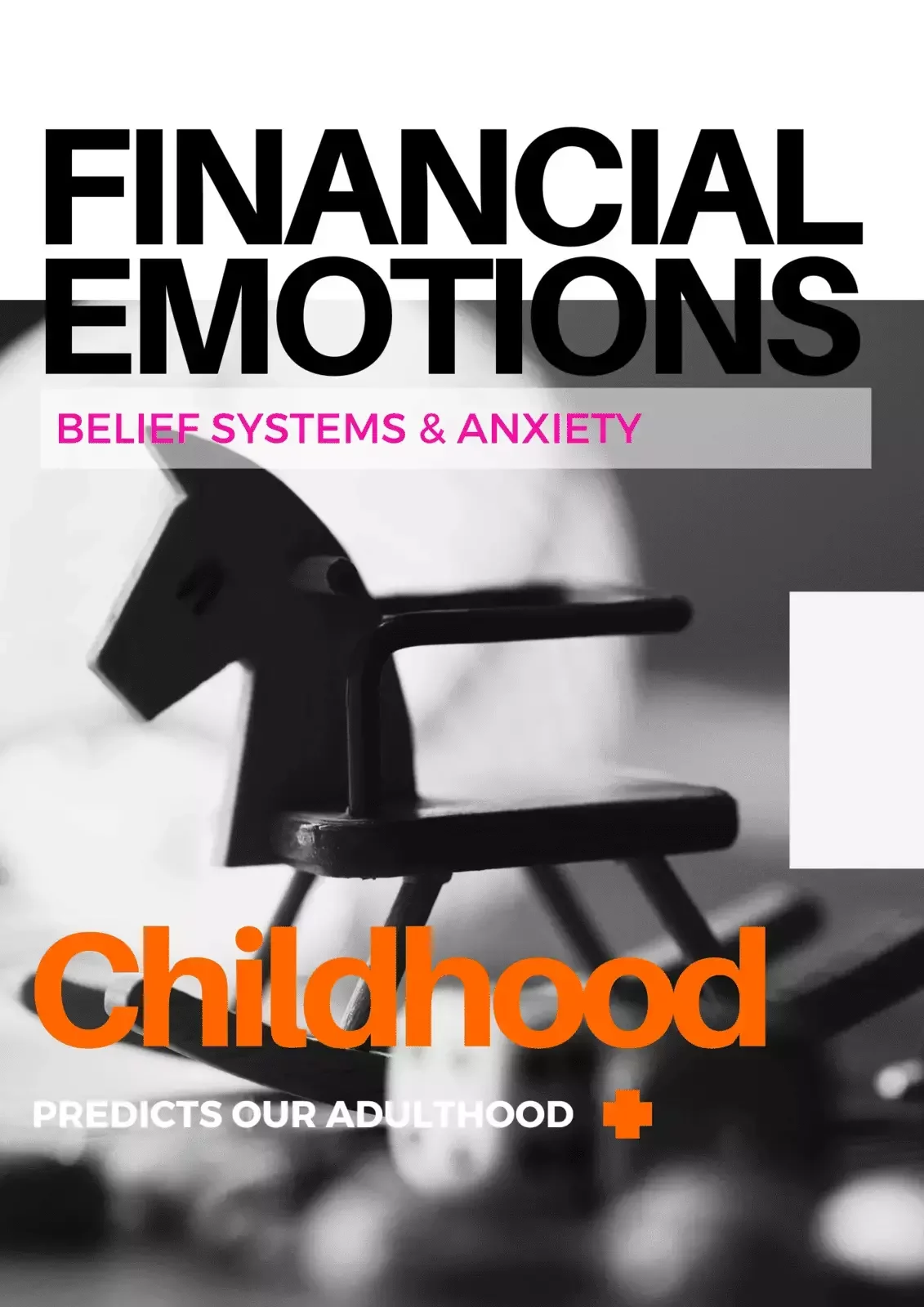
Financial Emotions | Belief Systems & Anxiety
As humans, we like to think of ourselves as rational beings, making informed decisions about our finances. But the truth is, our relationship with money is deeply emotional. Our financial choices are often driven by unconscious beliefs, shaped by our upbringing, experiences, and societal influences.
We will delve into the complex world of financial emotions, exploring how our psyche works around money and the profound impact of our belief systems on our financial well-being.
Childhood Origins: The Seeds of Financial Beliefs
Our journey with money begins in childhood. Our parents, caregivers, and environment instill in us attitudes and values that shape our financial psyche. We absorb messages about money, often unconsciously, through:
Parental modeling: Observing how our parents manage money influences our own financial habits.
Financial conversations: Hearing discussions about money, debt, or financial stress can create lasting impressions.
Socioeconomic context: Growing up in poverty, wealth, or middle class affects our perceptions of money and financial security.
Financial anxiety is a pervasive emotion, affecting people from all walks of life. Common sources of financial anxiety include:
Debt: Feeling overwhelmed by debt can lead to shame and guilt.
Uncertainty: Fear of the unknown, such as job loss or market fluctuations.
Comparison: Measuring our financial success against others.
This anxiety can manifest in various ways:
Avoidance: Procrastinating financial decisions or avoiding financial discussions.
Hyper-vigilance: Constantly worrying about money, leading to burnout.
Impulsive spending: Using shopping as a coping mechanism for financial stress.

Money Scripts & Emotional Associations
Early experiences forge our core beliefs about money, influencing our unconscious patterns of thinking that drive financial decisions.
Positive Emotional Associations
1. Security: Money provides stability and protection. Saving aggressively for emergencies, feeling secure.
2. Freedom: Money allows for independence and choices. Prioritizing saving for travel, associating money with freedom to explore.
3. Happiness: Money brings joy and satisfaction. Spending money on experiences, linking money to happy memories.
4. Pride: Money represents accomplishment and success. Investing in his business, feeling proud of financial growth.
Negative Emotional Associations
1. Anxiety: Money triggers stress and worry. Avoiding financial discussions, fearing debt and financial insecurity.
2. Shame: Money represents past financial mistakes. Struggling with overspending, feeling guilty about past debt.
3. Fear: Money inspires fear of loss or scarcity. Hoards wealth, fearing financial instability.
4. Guilt: Money represents indulgence or excess. Feeling guilty about luxury purchases, associating money with self-indulgence.
Money is scarce: Over-saving, reluctance to spend, or excessive frugality. Saves excessively, even when it means sacrificing enjoyment.
I deserve to spend: Overspending, impulse purchases, or accumulating debt. Example: Alex grew up with affluent parents who indulged his every whim. Now, he struggles with impulse buying and credit card debt.
Debt is shameful: Avoidance of debt, even beneficial debt (e.g., mortgages or student loans).Example: Emily's parents struggled with debt. Now, she avoids taking on debt, even for important goals like education or homeownership.
Money is a source of security: Hoarding wealth, reluctance to invest, or excessive risk aversion. Example: David's parents experienced financial insecurity. Now, he prioritizes saving and avoids investing, fearing loss.
Money equals success: Overemphasis on earning, excessive work hours, or prioritizing income over well-being. Example: Jamie's parents valued financial success above all else. Now, Jamie prioritizes work over family and self-care.
Reframed Money Scripts
1. "Money is a tool for freedom." (Replaces "Money is scarce.")
2. "I deserve to enjoy my hard-earned money." (Replaces "I deserve to spend.")
3. "Success is balanced living." (Replaces "Money equals success.")
4. "Debt can be a useful tool." (Replaces "Debt is shameful.")
5. "Security comes from diverse investments." (Replaces "Money is a source of security.")
By recognizing and reframing your money scripts, you can develop healthier financial attitudes and make more informed decisions. Identifying and Challenging Money Scripts: How to recognize and reframe your money scripts:
Reflect on your emotional responses and childhood experiences with money.
Identify patterns in your financial decisions.
Challenge negative self-talk and replace with positive affirmations.
Seek support from financial therapists or advisors.

Recognizing and Reframing Financial Beliefs
Self-Reflection: Identifying Money Scripts and Financial Identity
Understanding your money scripts and financial identity helps you recognize patterns and biases driving your financial decisions.
- Journaling: Write down thoughts, feelings, and experiences related to money.
Reflection questions:
- What are my earliest memories of money?
- How did my parents handle finances?
- What are my financial strengths and weaknesses?
- What triggers financial stress or anxiety?
- Identify money scripts: Look for patterns in your thoughts and behaviors.
- Assess financial identity: Consider how you perceive yourself as an earner, saver, or spender.
Reframing negative beliefs empowers you to break free from limiting financial patterns. Challenge negative beliefs:
- Ask yourself if they're based on facts or assumptions.
- Consider alternative perspectives.
- Reframe negative thoughts with positive affirmations.
Regular mindfulness practice helps rewire your brain.
- "I'll never be able to save" becomes "I can start small and build savings."
- "I'm not good with money" becomes "I'm capable of learning and improving."

Our emotional connection to money is complex and deeply personal. By acknowledging the psychological forces driving our financial decisions, we can begin to break free from limiting beliefs and cultivate a more positive, empowered relationship with money. Remember:
- Your financial emotions are valid.
- Your money story is unique.
- You have the power to rewrite your financial narrative.

Why Are We So Emotional about Money?
Why Are We So Emotional about Money?
Money is messy. It’s complicated. It’s oh-so-very-emotional. I know I’m not the only person who feels this way. So, how do we cope?
According to Ramit Sethi, author of I Will Teach You To Be Rich, the psychology behind our relationship with money is very underrated. In his new podcast, Sethi dives into the confusing emotions many of us feel when it comes to our finances. His advice is clear: Our feelings are almost always unrelated to the financial decisions we make and indicative of something much deeper.
Read the Harvard Business Review article HERE

How to Avoid Emotional Investing
Active monitoring of a portfolio is important for navigating the changing tides of financial markets. Still, it is also essential for individual investors to manage the behavioral impulses of emotional buying and selling that can come from following the market's ups and downs. Indeed, investors seem to have a knack for piling into investments at market tops and selling at the bottoms because it is not uncommon to get entangled in media hype or fear, buying investments at peaks and selling during the valleys of the cycle.
Read the Investopedia article HERE
